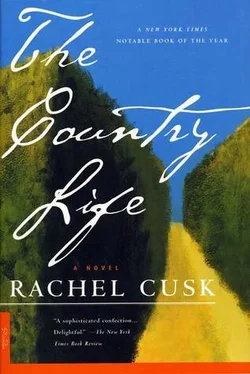‘I think so,’ I said. ‘Martin can help if we get lost.’
With no further excuse for lingering in the kitchen, I was forced to grasp the handles of Martin’s chair and begin wheeling him to the door. I was profoundly worried by the feeling of physical weakness which had started in my legs and now spread down my arms. I could barely push Martin’s chair, and the room seemed to tilt this way and that before my eyes. Once out in the hall, I realized to my horror that Pamela was hovering behind us. I wondered if she intended to see us off, and tried desperately to think of some means of detaching her.
‘We’ll see you later, then,’ I said.
‘Have a good time, darling,’ she said, still on our trail.
‘Fat chance,’ said Martin.
‘Goodbye,’ I said, more firmly, as we reached the door.
‘Do you want a hand getting him in?’ Pamela persisted, lingering in the doorway as Martin shot off down the ramp.
‘No!’ I cried. ‘We’ll be fine.’
I put my hand on the door as if to close it. Pamela stood her ground. Our eyes met.
‘Well, I’ll leave you to it,’ she said finally. She looked at me rather suspiciously; and then, to my relief, turned and made her way back down the hall.
I closed the door firmly after her, and went feebly down the steps to where Martin sat in the sun beside the car.
‘Open the door, then,’ he said.
I opened the door and he levered himself into the passenger seat. I closed the door after him and made my way round to the other side, feeling as if I were walking on something yielding, like marshmallow.
‘You forgot my chair,’ he said, when I opened the other door.
‘Oh. Sorry.’
I returned to the passenger side, where the chair sat abandoned on the gravel. Martin wound down the window.
‘Don’t just stand there,’ he said.
‘I don’t know how to collapse it.’
‘You put your foot on that thing at the back. That’s it.’
The chair folded flat and I carried it to the boot. I had never in my life felt less competent than I did in that moment. I opened the boot and laid the chair in it.
‘Get a move on, Ste-la!’ cried Martin from the front.
I realized that I had been performing every action in slow motion, so as to delay the moment when I would have to get in the car. The chair now stowed, there was however nothing else that I could do. I went back to the driver’s side and got in.
‘What’s the matter with you?’ said Martin plaintively.
Before my eyes was the most alarming panorama I had ever seen. Across the entire vertical axis of my side of the car extended a vast control panel, a cryptic ridge of dials and switches, knobs and graphs, teeming not merely with numbers but also abbreviations (‘m.p.h.’, ‘k.p.h.’, grunts redolent of a prerequisite familiarity), coloured squares, ruled lines, and a whole register of hieroglyphics telling of strange vehicular adventures: a small petrol pump, a group of waving lines like rising steam, three lamps whose beams shone three different ways. From this background rose the mute black circle of the steering wheel, bristling with levers. Pedals lay at my feet like waiting irons. Through the windscreen, beneath the long flank of the bonnet, the engine sat coiled, waiting to burst into life.
‘I can’t drive,’ I said.
There was a long silence. Beside me, Martin sat looking straight ahead.
‘Right,’ he said, finally.
‘If your parents find out,’ I continued, ‘they’ll send me home.’
‘Probably.’ He nodded. ‘They did say driving was essential, Stel-la.’
‘I know.’
It seemed futile to explain the process by which, conveniently or otherwise, I had neglected to take notice of this requirement at the time, or to draw this neglect to anyone’s attention afterwards. What concerned me in that moment was what Martin intended to do about it. Having confessed to him, I had put myself entirely in his hands. Although I had been aware that our intimacy had gathered strength since the moment of our first meeting, it had never occurred to me to test it. Now I had a sense of my bond with Martin vying with that of his parents; and as he sat beside me in the car, pulled in either direction by these conflicting loyalties, his ruling took on for me an importance beyond the merely expedient. My heart lay hollow, waiting to be filled by his regard; and the thought of his refusing me, and turning me over to be dealt with by the familial authorities while he withdrew into their ranks, was unbearable.
‘It can’t be that hard,’ he observed presently. ‘I know how it works. I’ll just tell you what to do.’
‘All right,’ I said recklessly. ‘If you’re sure you won’t be frightened.’
‘It would be an honour,’ said Martin, ‘to die with you, Stel-la. Turn the key.’
I found the key, which was already in the ignition, and turned it. There was a stutter of life from beneath the bonnet, and then the car slowly began to tremble around us.
‘Is it on?’ I said. I had expected a roar of some kind.
‘Of course it’s on. Now, there are three pedals at your feet. On the right, the accelerator. Press it.’
I pressed it with my foot, my hands gripping the wheel. The noise of the engine did grow louder, but the car did not move. Thinking this to be because I had not pressed hard enough, I put down my foot until it would not go any further.
‘Stop!’ shouted Martin, above the scream of the engine.
‘Why didn’t we move?’ I said as it died away.
‘Because we’re not in gear. I only asked you to press it so that you’d know which one it was. The middle one is the brake. Press that.’
I did so.
‘The pedal on your left is the clutch. You press the clutch when you want to change gear.’
‘OK.’
‘When you press the clutch, you take your foot off the accelerator. Then, when you’ve changed gear, you put your foot back on the accelerator again.’
‘How do you change gear?’
‘You just — look, I’ll tell you what. I’ll change gear for you. I’ll just shout clutch , and you put your foot on the clutch, OK? You concentrate on steering.’
‘OK.’
‘OK. Clutch.’
I looked through the windscreen at the remote spectacle of the drive. The car was pointing directly down it, for which I was grateful.
‘Clutch, Stel-la.’
‘Oh. Sorry.’
I pressed the clutch and Martin manoeuvred the gearstick beside me with his left hand.
‘Good. Now, keep your foot on the clutch for the time being. Release the brake.’
‘I’m not touching the brake,’ I said, bemused.
‘No, the hand brake. It’s beside you. You press the front bit and it goes down.’
‘Like that?’
‘Fine. Now, hands on the wheel, Stel-la. Put your foot on the accelerator, and very slowly take your foot off the clutch.’
I pressed the accelerator and the noise of the engine mounted.
‘Not that much!’ shouted Martin. ‘Just a little bit. That’s right. OK, very slowly off the clutch.’
It is difficult for me to convey my surprise, despite the advance warning I had received, at the way in which with the command of my feet the whole world became a blur of noise and motion. Had I been able to drive entirely with my hands, I would probably have applied more natural instincts to the business of pulling away from the house. As it was, the simplicity of Martin’s instruction had been profoundly deceptive; for I had no premonition of the chaos my gentle paddling would unleash. I took my foot off the clutch and the car bolted forward at such speed that I pressed indiscriminately at the pedals in panic, while the jolting scenery bore down on us and Martin shouted vainly beside me above the roar of the engine. I had no time in this onslaught of events even to think about controlling them. All I could do was to try and recall, with a contrasting lassitude at once terrifying and inalterable, how to stop the car. Very slowly, my mind dimly remembered that ceasing to press the accelerator would have some effect on the speed at which we were travelling. Even slower, my foot responded; against its will, I should add, because instinct told it to press harder the faster we went. The car veered off the gravel drive and chugged across the grass. It heaved once, twice, and died.
Читать дальше












